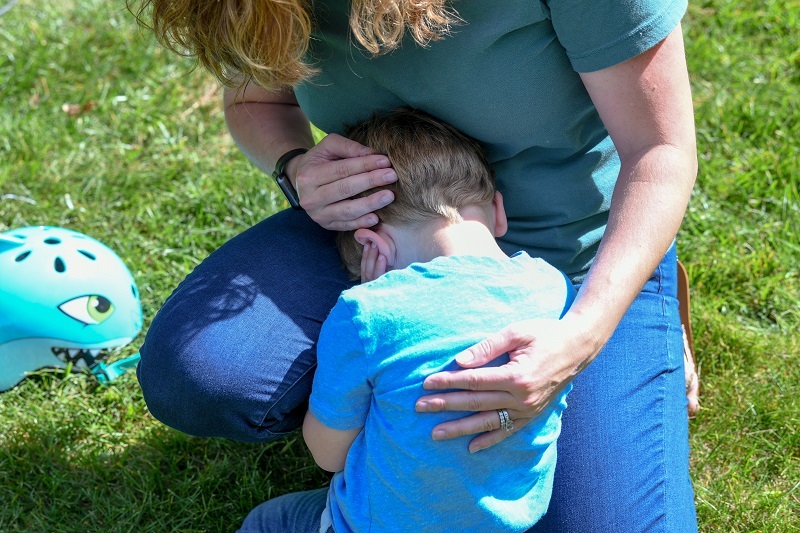Healthy Ways to Discipline a Child

July 28, 2023
Parenting is not a one-size-fits-all situation. No two children are exactly alike, and neither are their parents. On top of that, a flood of theories, books and articles make a confusing variety of claims about how best to discipline a kid.
Despite all those varied perspectives, are there any universal truths when it comes to disciplining children?
“There is not one best way to parent, just as there is not one best way to learn or one best way to love your partner,” says Steven Kairys, M.D., pediatrician at Jersey Shore University Medical Center. “However, some general principles are useful to consider, since the major goals of parenting should be to raise children to be responsible adults, to be caring of themselves and others, and to live independent and healthy lives.”
How to Discipline Effectively
Focus on what motivates your child. Parenting takes time and focused attention to understand the needs and learning styles of the child. Discipline should grow out of that understanding. Parents who do not understand what motivates their child will struggle to respond to behavior effectively.
- For example, some children might be motivated by competition—they can be motivated by setting behavior goals to meet or beat.
- Others might be motivated by praise—they can be motivated by affirming words of encouragement.
Understand what’s developmentally appropriate. “Familiarize yourself with developmental behaviors,” says Brett Biller, PsyD, pediatric psychologist at Hackensack University Medical Center. “Understanding that some frustrating behaviors, although disruptive and unwanted, may be developmentally appropriate.”
- For instance, when a young toddler in a high chair throws food on the floor, stares at it and then looks at the parent, they are not throwing the food for attention. They are beginning to explore that when objects are no longer in their sight, they still remain.
Focus on logical consequences rather than just punishment. It is easy to think of discipline as relating only to punishment or other adverse responses to undesirable behavior. But to be effective, discipline should be seen as a facet of parenting that grows from a place of respect and a sense of safety and clarity for the child, focusing on logical consequences to behavior rather than solely relying on punishment.
- For example, If a child hits a sibling, the parent should affirm that the child had strong feelings that resulted in their aggressive action. They must be reminded that while they have certain feelings, they cannot express them with physical aggression.
- The parent can explore how this action made the sibling feel and provide the child with an option to apologize.
Use positive parenting. Dr. Kairys promotes ‘positive parenting', which he describes as, “a style of parenting that teaches the use of discipline that promotes the child’s self-worth while correcting the misbehavior. Positive parenting is proactive and deliberate.”
- In practice, it looks like this: Parents develop a parenting plan in advance that considers how they would like to respond to their children in certain circumstances.
- That way, when a concern arises, the parent can respond in a thoughtful, calm way that explains how the child’s action impacts the parent or the person on the receiving end.
Be consistent: Being firm and consistent in parental responses tells the child that the parent is trustworthy. Consistency also matters between parents: Each parent may have a different way of communicating, but the message should ultimately be the same.
- For example, a parent who responds harshly to an error one day and ignores or dismisses it the next, does not help the child feel secure and diminishes the effectiveness of discipline.
Avoid Corporal Punishment
Physical discipline—corporal punishment—has been recognized as harmful by the American Psychological Association. “Hitting and spanking can lead to emotional, behavioral and academic problems over time,” Dr. Biller says.
In fact, research published by the Society for Research in Child Development suggests that corporal punishment may harm the child by affecting normal brain development and decreasing brain size and intelligence.
“Non-physical discipline techniques, such as ‘painless parenting’, that teach children right from wrong, are safer and more effective,” Dr. Biller says. “Children learn best from our example. Be the person that you want your children to be.”
Next Steps and Resources:
- Meet our sources: Brett Biller, PsyD, and Steven Kairys, M.D.
- To make an appointment with a child psychologist near you, call 800-822-8905 or visit our website.
The material provided through HealthU is intended to be used as general information only and should not replace the advice of your physician. Always consult your physician for individual care.





